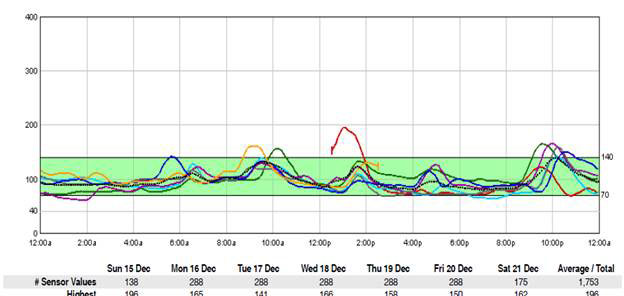
This original research was presented by Research team at Jothydev’s Diabetes Research Centre headed by Dr.Jothydev Kesavadev at the 7th International Conference of Advanced Technologies & Treatments (ATTD) at Vienna, Austria.

Glycemic excursions in pre-diabetes are seldom evaluated in clinical practice.
We assessed clinical utility of CGM in pre-diabetes and its impact on modifying lifestyles to prevent diabetes.

6 patients were enrolled in 3 month study via convenience sampling based on ability and willingness to follow instructions. Mean age 48.5 yrs, mean BMI 26.73 kg/m2. Measured blood glucose were <126 mg/dl during fasting and <150 mg/dl post breakfast. CGM was performed using iPro2 recorder at 0 and 3 months(5-7 days).Advice on lifestyle modifications were repeated once in 2 weeks by a multi-disciplinary team of doctors, dietitians, pharmacist, nurse educators, device technician, psychologist etc. who made detailed analyses of CGM recordings.

Trends observed in CGM at month 0 included hyperglycemic spikes 30- 90 mins after breakfast and dinner and glycemic variability missed in usual SMBG. At 3 months, CGM revealed smooth curves with average weight reduction of 2.35 kgs.(Table)
CGM may prove an excellent tool to unravel glycemic excursions most often missed in SMBG in pre-diabetes patients. CGM could evolve as motivational tool in pre-diabetes patients to prevent progression to overt diabetes.
CGM Parameters
(n =6) |
Mean
(mg/dl)
(0 month) |
Standard
deviation
(0 month) |
Mean
(mg/dl)
(3 months) |
Standard
deviation
(3 months) |
| FBS |
110.8 |
20.77 |
91 |
6.42 |
| HbA1c |
5.9% |
0.38 |
5.4% |
0.28 |
| No: of High Excursion |
7.2 |
5.23 |
2.2 |
2.14 |
| No: of Low Excursion |
2.8 |
3.82 |
1.5 |
1.52 |
| Highest Sensor Value |
178.2 |
28.99 |
151.5 |
6.44 |
| Lowest Sensor Value |
66 |
12.33 |
73.8 |
3.06 |
| Duration within 70-40 mg/dl |
89.7 |
9.27 |
96.3 |
2.73 |

